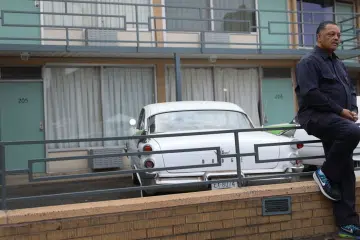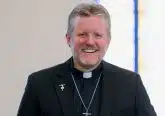Colleges help form future missionaries
Friday, October 8, 2010
By David Eck
ARCHDIOCESE — Grounded in their religious traditions, Catholic colleges and universities in the Cincinnati archdiocese maintain academic programs that help instill in students a lifelong commitment to service.
A key mission for the schools, service opportunities include international immersion trips, service learning experiences, domestic and international projects and full-time volunteer programs for graduates. The experiences help students connect their faith with a commitment to The programs often build on a commitment to service that students developed in high school.
 |
| University of Dayton students Laura Ebetino, center, and Alyssa Wagner, far right, interact with citizens of the Dominican Republic during an immersion trip to the island in 2008. Both students have since graduated. (Courtesy photo) |
“For us, it starts with the call of Jesus and the call of our faith to care for each other, to live in solidarity with our brothers and sisters in our communities and around the world,” said Nick Cardilino, director of the Center for Social Concern at the University of Dayton. “It’s just such a critical and important part of our faith.”
University of Dayton students serve the poor around the world through the center’s cross-cultural immersions and service trips over school breaks. Students have worked with Marianists in Ecuador, in an orphanage in Mexico and on a medical team in Honduras. Other destinations have included Guatemala, Zambia, Cameroon, El Salvador, Belize and India.
Each trip is unique, but they all focus on cultural immersion and have a focused service component, said Mary Niebler, coordinator for cross-cultural immersions at University of Dayton.
“The service is different depending on the trip,” Niebler said. “The biggest service that I stress to students that they can be doing is building those relationships with people. Sharing yourself is a service.”
In developing those relationships, stereotypes on both sides are broken, resulting in less division between cultures. Students gain a sense of global solidarity and a broadening of horizons and understanding through the experience, Neibler said.
The students typically return with a greater appreciation for their own lives, but they also gain a new perspective. They see the happiness in a less-hectic life without all the distractions of Americans’ busy lives. Faith is strengthened because students see how ingrained it is in the lives of those in the host country, Neibler said. Students may also have a renewed appreciation for family because of their experiences.
Some students who have been active in the trips as undergraduates spend a year or more volunteering full-time in service or mission work after graduation. Students often make that commitment to service the focal point of their lives and careers.
“A lot of our students who are really heavily involved actually end up going on to do ministry work,” Cardilino said. “Others are working in non-governmental organizations all around the world…or doing social work.”
Alyssa Wagner is one such student. The 2009 University of Dayton graduate said her experience from immersion trips to the Dominican Republic as a student helped focus her career. A Spanish and international studies major, Wagner works with immigrants at Dayton Hispanic Ministries. She now wants to spend her career helping immigrants.
Wagner first went to the Dominican Republic in 2006 as a part of a University of Dayton service immersion trip. She took additional trips to the Caribbean island and eventually met her boyfriend there. She has gone back to the Dominican Republic several times on both mission and personal trips.
“I think we have that luxury of being able to decide on a career that might not just be for the lucrative side of it,” Wagner said. “We now are able to say ‘We’ve had it all’ so we need to help other people who haven’t even had close to all.”
At Xavier University, students can participate in service learning semesters during which they take a full load of classes as part of an immersion experience. The trips typically involve excursions to Nicaragua, but have also included Ghana, Nepal and India. Students usually opt for service learning semesters as sophomores, and the program is open to all majors.
The students have been involved with nutrition programs for babies, worked in a children’s hospital, helped at an institution for mentally and physically and handicapped people and have been involved in encouraging homeless children to enter a shelter.
The college students combine the service with education by taking Spanish, theology, history, cultural and society classes, as well as the service class. The concept provides context and reflection on the immersion experience.
“I think the students that do this program have had a concentrated three-month experience that they are able to take with them to whatever they do later and build on it,” said Irene Hodgson, a Xavier Spanish professor and interim director of the school’s academic service learning semesters.
“The importance of direct service is to put a face on the problem,” she said. “What I see is many of them going into different career paths where they are wanting to help try to find a solution.”
Shannon O’Neill, a 2007 Xavier graduate, participated in a trip to India in 2004, working in an orphanage. The trip turned O’Neill, who grew up in St. Teresa of the Child Jesus Parish in Springfield, toward social work.
“I definitely know that the social work career is the one for me. In fact, I didn’t even know that until I went to India,” said O’Neill, who is now working for a supportive housing program for people with mental illness in Colorado. “I definitely gained an appreciation for people [who] can teach you life lessons that you’re never going to get in a classroom.”
Dan Marschner was part of a service learning experience in Nicaragua in 2000 and returned as an assistant in 2004. The trips helped give him direction. After returning, Marschner became active with the homeless in Cincinnati, continuing the work he did in Nicaragua.
“When I look back on it now, I think it was really a turning point in my life,” Marschner said. “I was really seeing that homelessness in Nicaragua. It was such a very powerful experience to see the conditions in which people lived. I really wanted to come back and learn about homelessness in Cincinnati.”
Marschner also spent about three years in Chile working with Jesuit Volunteers International after graduating from Xavier in 2001 with a degree in psychology. He lived in a community with three other volunteers and worked with the elderly as a social worker.
A key component of the Jesuit Volunteers Corps — a service organization that places volunteers in domestic and international locations to work with the poor and live in community with other volunteers — is combining action and reflection, helping to build a lasting commitment to service.
“I think it changes your perspective,” Marschner said. “It’s hard to look at anything the same way once you’ve had an experience like that. It’s an opportunity to grow personally and to really actively participate in community.”
After earning a master’s in international politics, economy and development from Fordham University in 2008 and teaching at Cristo Rey School in East Harlem, N.Y., Marschner returned to Xavier and is now an admissions counselor.
Sister of Charity Mary Boosker, coordinator of service learning at the College of Mount St. Joseph, said students there have gone to Guatemala and Africa for service projects. Weeklong experiences to Appalachia and Indian reservations in the United States are also possible.
A group of nursing students from the Mount visited Burundi, Africa, last year and has proposed setting up a trip there to work in a clinic for the needy. The trip has been postponed, but the idea has left a lasting impact on the students.
“They were such wonderful leaders,” Sister Mary said. “I just saw them come alive when they came back.”
For her, immersion and service trip are touchstones that motivate students to start and continue serving in their local communities when they return.
“That’s a wonderful donation of your time and energy, but there are local needs that are crucial,” Sister Mary said. “That’s just so crucial to my belief that we find God in the everyday parts of our lives.”
David Eck can be reached at [email protected].
Tags:University of Dayton













